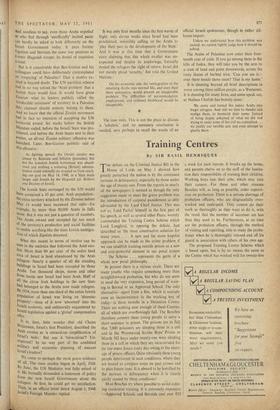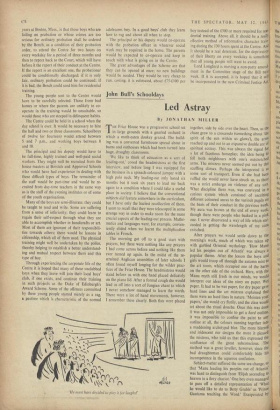Training Centres
By SIR BASIL HENRIQI.JES rr HE debate on the Criminal Justice Bill in the I House of Lords on May 1 showed how greatly perturbed the nation is by the continued increase in delinquency, especially by those under the age of twenty-one. From the reports in nearly all the newspapers it seemed as though the only suggestion made to meet the grave problem was the introduction of corporal punishment so ably advocated by the Lord Chief Justice. This was not so. Lord Parker himself in the first part of his speech, as well as several other Peers, warmly commended the Training Centre Scheme which Lord Longford, in opening the debate, had described as 'the most constructive solution for many years. . . . A new and far more hopeful approach can be made to the crime problem if we can establish training outside prison as a new and ever-powerful element in our penal system . . . 'the Scheme . . . represents the germ of a whole new penal philosophy. . .
At present there is a vicious circle. There are many youths who require something more than straightforward probation, but who do not seem to need the very expensive, long period of train- ing in Borstal or an Approved School. The only alternative—apart from a fine, which is scarcely even an inconvenience to the working boy of today—is three months in a Detention Centre. There are nothing near enough of these Centres, all of which are overflowingly full. The Benches therefore commit these young people to serve a short sentence in prison. The prisons are so full that 7,000 prisoners are sleeping three in a cell and in the Wormwood Scrubs Boys' Prison in March 162 boys under twenty-one were sleeping three in a cell in which they arc incarcerated for far too many hours every day owing to the short- • age of prison officers. Quite obviously these young people deteriorate in such conditions, where they are bound to compare notes on past crimes and to plan future ones. It is absurd to be horrified by the increase in delinquency when it is clearly partly caused by these conditions!
Most Benches try where possible to avoid order- ing residential training. It is extremely expensive --Approved Schools and Borstals cost over £10 a week for each inmate. It breaks up the home, and parents shelve on to the staff of the Institu- tion their responsibility of training their children. Working boys lose their jobs, which may ruin their careers. For these and other reasons Benches will, as long as possible, order supervi- sion on probation. There is a serious shortage of probation officers, who are disgracefully over- worked and underpaid. They cannot do their work as thoroughly as they want to do it, with the result that the number of successes are less than they used to be. Furthermore, at no time are the probation officers, through the method of visiting and reporting, able to study the proba- tioner when he is thoroughly relaxed and off his guard in association with others of his own age.
The proposed Training Centre Scheme which is based upon, but is by no means the same as the Centre which has worked well for twenty-five years at Boston, Mass., is that those boys who are failing on probation or whose crimes are too serious for ordinary probation shall be ordered by the Bench, as a condition of their probation order, to attend the Centre for two hours on every weekday for a period of three months and then to report back to the Court, which will have before it the report of their conduct at the Centre. If the report is an excellent one, the probationer could be conditionally discharged; if it is only fair, ordinary probation could be continued; if it is bad, the Bench could send him for residential training.
The young people sent to the Centre would have to be carefully selected. Those from bad homes or where the parents are unlikely to co- operate in the training would be unsuitable, so would those who are steeped in delinquent habits. The Centre could be held in a school when the day school is over. It would be necessary to hire the hall and two or three classrooms. Schoolboys of twelve (or fourteen) would attend between 5 and 7 p.m., and working boys between 8 and 10.
The principal and his deputy would have to be full-time, highly trained and well-paid social workers. They might well be recruited from the house masters at Borstals and Approved Schools who would have had experience in dealing with these difficult types of boys. The remainder of the staff would be part-time and would be re- cruited from day-time teachers in the same way as is the staff of the evening institutes or of some of the youth organisations.
Many of the boys are semi-illiterate; they could be taught to read and write. Some are suffering from a sense of inferiority; they could learn to regain their self-respect through what they are able to accomplish whether in handicrafts or art. Most of them are ignorant of their responsibili- ties towards others; there would be lessons in citizenship, which all of them need. The physical training might well be undertaken by the police, thereby helping to establish a better understand- ing and mutual respect between them and this type of boy.
Through experiencing the'corporate life of the Centre it is hoped that many of these unclubbed boys when they leave will join their local boys' club, if one exists, and continue their training in such projects as the Duke of Edinburgh's Award Scheme. Some of the offences committed by these young people started merely as a rag, a pastime which is characteristic of the normal 'He must have decided to play it for laughs!' adolescent boy. In a good boys' club they learn how to rag and above all when to stop.
The principal or his deputy would co-operate with the probation officer in whatever social work may be required in the home. The parents would be expected to co-operate and keep in touch with what is going on in the Centre.
The great advantages of the Scheme are that they can be opened at once; no new buildings would be needed. They would be very cheap to run, costing, it is estimated, about £75-£100 per boy instead of the £500 or more required for rest. dential training. Above all. it should be a reallY effective method of reformative character train' ing during the 130 hours spent at the Centre. And it should be a real deterrent, for the deprivation of their liberty on every weekday is something that all young people will want to avoid.
Lord Longford is moving a non-party amend' meld in the Committee stage of the Bill next week. If it is accepted, it is hoped that it will be incorporated in the new Criminal Justice Act.







































 Previous page
Previous page